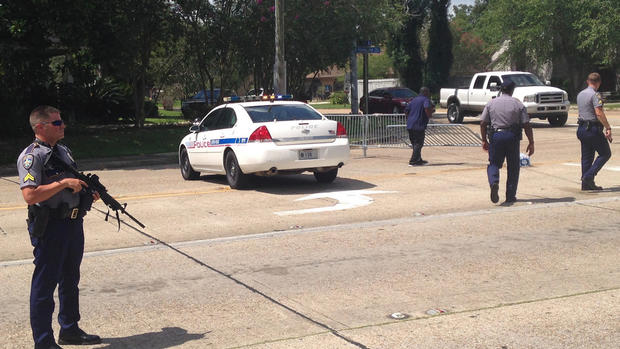Why police shootings will drive up law enforcement costs
In the 1890s, officials fearful of a brewing riot in one frontier town called for the Texas Rangers, the legendary mounted law men. They were stunned when a single ranger showed up. "There's only one riot," he said.
Those days are long gone. With recent shootings of police officers in Baton Rouge, Louisiana, and Dallas, as well as gunfights with mass murderers armed with semi-automatic rifles in Orlando, Florida, and San Bernardino, California, it is a far more stressful world for America's 800,000 police officers, often called "the blue canaries" by firemen because they are the first to go in -- and the first to die. Thirty-one officers have been killed by firearms this year, nearly double the number in all of 2015.
Given the evident willingness of the shooters to kill as many as law enforcement personnel possible, the first patrol officers on the scene can no longer wait for SWAT teams and FBI negotiators to arrive. FBI statistics show that most casualties occur in the first seven minutes after the first shots are fired. Nearly half of the police officers who were first on the scene also became casualties.
The result: We are likely to see multiple officers on every call, even a routine one such as a domestic disturbance, particularly if there is fear of an ambush. Heavy weapons will be available, and the blue uniform could be replaced by a black ballistic vest and helmet capable of stopping a military round. New York City police union Chief Patrick Lynch has called for every squad car to become a "mini-counter-terrorism unit."
Cops say they don't like this new reality. And the Obama administration, which has been fighting to prevent police from becoming -- and looking like -- a paramilitary force, doesn't like it either.
Cities and municipalities such as Cleveland, which already spends 60 percent of its budget on police, don't like footing the bill. And their citizens, who often see their calls to police delayed or go unanswered, hate it. Worst of all, minorities and those who live in inner cities, many of whom already have a negative impression of the police, could now be even more inclined to view a cop as "an occupying soldier," as writer James Baldwin described him more than 50 years ago.
But that won't change reality. In the wake of the killing of the three police officers in Baton Rouge by an ex-marine with military training, the New York City police department has announced that none of its officers will patrol alone. Boston has said its officers will work in pairs, and New Orleans, already one of the country's most dangerous cities, said two squad cars will respond to each call.
"Now, you need a couple of officers to handle a call and a couple more to handle their backs," said Mike Willis, national training director for the U.S. Deputy Sheriffs' Association.
"By definition, this reduces by half the manpower that you have on the street," said Jim Pasco, executive director of the Fraternal Order of the Police (FOP).
And probably by a lot more than that, because police will likely give more thought to going into potentially dangerous situations and protecting each other, several officers told CBS MoneyWatch. Some veteran officers have even taken themselves out of the game, forgoing dangerous patrol work for desk jobs to finish out their careers.
The choice to double up while on patrol is relatively easy to make for big cities such as New York, with a police force of 24,000. With their limited law enforcement budgets, small communities around the country will have little choice but to stick with the practice of having only one person per car. "There's not a lot of changes for them," said Willis.
And it gets worse when you add in the new equipment required to "up-armor" against guns like an AR-15, and to pay for it with insufficient municipal budgets. A quick look at the disparity in officer's salaries gives some indication. In states like California, the average salary for law enforcement ranges from $65,000 to $94,000, but in Mississippi it is less than half that. So it's likely that many cops in that state and elsewhere won't have ballistic vests and other protective gear.
Federal programs once provided for armored vehicles and other paramilitary equipment. But protests after the killing of a black man in Ferguson, Missouri, caused the Obama administration to withdraw some of these items from police departments, forcing local communities to pay for them or do without. The FOP's Pasco said that after a meeting with federal officials recently, "The president has committed to re-review this list," including ballistic helmets like the one that saved an officer's life in Orlando.
One issue that can't be covered by dollars and cents is the stress police face, both medically and emotionally, when they are in the line of fire, both as targets of terrorism and suspects in cases of police abuse.
"Overwhelmed officers may potentially resort to excessive drinking and other forms of self-medication that often coincide with stress and trauma," said Terrence Cunningham, president of the International Association of Chiefs of Police, in Police Chief magazine. "These stressors can build up and lead to officer suicide, divorce and other destructive behaviors."
"Now, that stress is exponential," said the FOP's Pasco. "They have always been the first responders to terrorism. Now the terrorism is directed against them."
